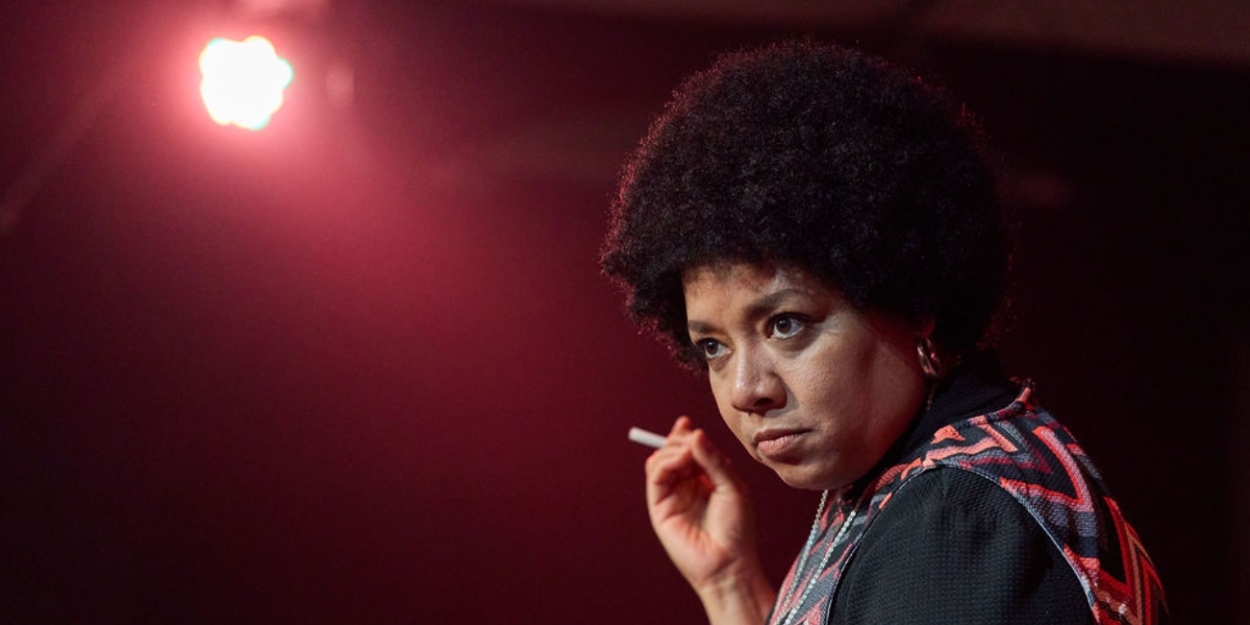Review: LETTERS TO KAMALA/DANDELION PEACE at Voices Festival Productions
A world première by an African-American woman playwright.

Rachel Lynett's Letters to Kamala, the first half of a double bill in Spooky Action's space through June 30, imagines that three female activists, crucial in 20th century history, might have a thing or three to say to Vice President Harris. Each lady considers a question they suggest Harris might pose to them in their roles as Ancestors in the struggle by women in America for parity in the equality proposed by the authors of the Declaration of Independence whose signatures are craftily projected as a backdrop in Heidi Castle-Smith's simple, sturdy set design. That question, how a country with a broken heart can heal, of course, has the same relevance in any decade or century of US history.
Black newspaper owner Charlotta Spears Bass (d. 1969) and political activist Charlene Mitchell (d. 2022) ought to take up more space in annual Black History Months; Bass, editor of The California Eagle from 1912-1951, ran for Vice President on the Progressive Party ticket in 1952. She articulates the methodology women had to use before suffrage, during Jim Crow, and after integration, pointing out that winning wasn't required of her and her peers, but that raising issues of importance mattered most. Fiercely portrayed by Kendra Holloway, Bass' importance to the Civil Rights Movement would have been better known if women in America had had equal citizenship.
Likewise, the tough-talking, Afro-wearing Mitchell, played with mid-20th century or perhaps Black Power-empowered strength by Fatima Quander, highlights how hard heart-mending has been because of the consistent injustices Black people have endured for centuries. She tells the unseen Kamala Harris how furious she is that White people seem to have just found out about the 1921 destruction and massacre of Tulsa's Black community only because the centennial of the event rolled around. The US Communist Party nominated Mitchell for its Presidential ticket in 1968.
Representative Patsy Matsu Takemoto Mink (d. 2002) co-authored Title IX in 1972. Thanks to this Hawaiian-born, Japanese-American Congresswoman, Chamique Holdsclaw, Brittney Griner, and Caitlin Clark could "major in basketball" (and prep to turn pro) as athletes in college programs. Mariele Atienza's Mink, a figure of dignity in a professional woman's high-collared, blue sheath, recalls Harris being prevented from applying to medical school and being regarded as "power-hungry" while her male peers are hailed for being "ambitious." She sought the Presidency as an anti-war Democrat in 1972.
David Lamont Wilson's sound design for Letters to Kamala features "Oh, Freedom," "We shall Not be Moved," and "The Battle Hymn of the Republic" as well as sound bites of Harris' debates with Biden. Lynett has masterfully sketched the lives and thinking of three really important and powerful women of color.
The three women in Lynett's second play, Dandelion Peace, may not be as important, but their situations are. Using the same excellent cast, Lynett somehow creates a microcosm that reveals why we can't all just get along. Set in an urban "community garden," charmingly organized by Castle-Smith and Props Designer Tyra Bell, Atienza (now playing Moira), Holloway (as Anita), and Quander (Zuri) argue while they potter. Sunflowers ("they block the sun") and dandelions ("they're WEEDS") are against the rules. Moira says she just wants to help everyone follow the rules, but she's a control freak. Zuri says she just wants to garden the way her farmer father taught her, but she's a different species of control freak. And Anita thinks that dandelions are people too, and she's a lack of control freak. All three are drama queens. And the play is funny, until it isn't. When Zuri escalates the garden variety conflict by taking matters into her own hands, puts on overalls and headphones, and wildly dances to an over-loud "Livin' My Life Like It's Golden," everything changes. (Anyone who's ever attended The Condo Association meeting will notice The Way of the World.) If the choreography is by Chitra Subramanian, the boogy-ing is accomplished with abandon by Quander.
Brandee Mathies' costumes perfectly suit the differing periods in Letters to Kamala; Holloway's Bass wears a wonderful, 1920s black dress and then some casual denim and a bandanna on her hair as Anita in the garden; Quander's Mitchell wears hoop earrings with her colorful 1960s mini-dress and the aforementioned overalls while pruning with the garden tool from hell; Atienza's garden outfit is the grey, three-piece suit of the true petty bureaucrat that Moira is, complete with an apron so that she never gets soiled (on the outside at least).
A. Lorraine Robinson, who has partnered with Ari Roth in forming Voices Festival Productions, directs both plays. The characters in Letters to Kamala constantly move from platform to chair to stool to platform, and it is never really clear why (it's more than a little distracting because the acting is so good and the characters so engrossing). But her work in Dandelion Peace really pops. The many shifts in pace and tone in Lynett's script call for care and necessitate difficult coordination because it looks like a play about a community garden, but it quacks like a play about how lousy people can be at living with each other in community. The two-hour production and its ample series of post-show discussions informs while it entertains.
(Photo of Fatima Quander as Charlene Mitchell by DJ Corey)
Reader Reviews

Videos

